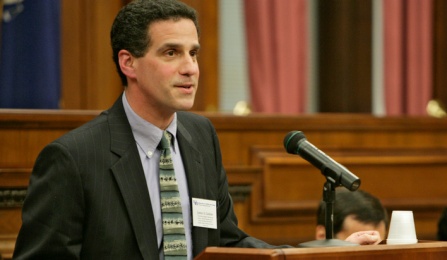Faculty Stories
Scholar-in-residence appointment extends Gardner’s research

Professor James A. Gardner has been appointed Federalism Scholar in Residence for the European Academy’s annual Institute for Studies in Federalism and Regionalism.
What happens when a nation’s federal government and one of its states or provinces disagree with each other? That’s the central issue of Professor James A. Gardner’s current research in constitutional law, a project he has followed in the United States, Canada and Spain.
Now Gardner is broadening his inquiry to a handful of other countries. And his recent selection as Federalism Scholar in Residence for the European Academy’s annual Institute for Studies in Federalism and Regionalism will afford the opportunity to study the issue as it plays out in the European Union.
The scholar-in-residence appointment – for which Gardner was selected after a competitive process – entails spending two weeks at the Free University of Bozen-Balzano, in northern Italy, in early February. There, Gardner will present an academic paper on federalism and regionalism, addressing an audience of EU and member state government officials and European scholars.
In addition, he will interview officials and scholars on his central question of “intergovernmental contestation.” “Italy is an interesting case,” he says, “because it’s not fully federal but it’s moving in that direction.”
The research in Italy comes in addition to several other planned research trips abroad. With a grant from the Baldy Center for Law & Social Policy, Gardner will travel in January to Switzerland and Austria. Planned for the summer are research in Germany and Argentina.
“I am building up an ever-broadening base of knowledge and work in comparative federalism, and trying to study as many governments as I can,” Gardner says. “I’ll talk to scholars and academics who are experts in the federalism of the local jurisdiction, and I’ll also interview provincial officials to ask them directly: When the federal government does something you don’t like, what do you do about it?
“Given the seeming advantages that a central government has over provincial governments, nevertheless we observe some of the time that states and provinces and cantons and so forth succeed in getting their way. My project deals with, how is that possible?
“In all these federal states there is a constitution which says that things will be a certain way: here are the powers of states or provinces, here are the powers of the central government, here are the ways in which conflicts between provincial and central powers are resolved. But the constitution doesn’t seem to have a very binding effect on how these struggles actually play out. Subnational units innovate or improvise or make end runs around the constitution to get what they want.
“This is a question of constitutional law: Is it possible to build a constitutional system that operates in a particular way, or is it always vulnerable to these opportunistic end-arounds?”
It’s a question that will arise as well in the course that Gardner will teach at SUNY Buffalo Law in the spring semester, Comparative Constitutional Law.